In one of last week’s Scale Warrior Village live meetings, I shared something personal about an experience that changed me as a person: how Cee Lo Green changed my life.
Yes, that Cee Lo. If you’re not a fan of Cee Lo Green’s 2012 song “Fu– You”, or, if hearing curse words bothers you, then you probably shouldn’t click this link to the uncensored music video. But please do continue reading — there’s no cursing below, I promise.
Don’t get me wrong; It’s not my intention to alienate anyone who dislikes cursing. In fact, I can relate more than you know. I’ll explain.
Please do, Sam, you’re not making sense. Okay, okay, I’m getting there.
For most of my young and adolescent life, I was raised in a strict and conservative home. 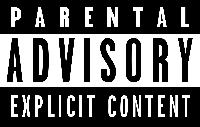 Faithful attendance at a house of worship every week, modest clothing, only the best behavior at school, only the appropriately-rated movies, and never ever a profanity out of my mouth. To this day, I remember the swift consequences of repeating a new word I’d learned down the street. (Thanks, Mom.)
Faithful attendance at a house of worship every week, modest clothing, only the best behavior at school, only the appropriately-rated movies, and never ever a profanity out of my mouth. To this day, I remember the swift consequences of repeating a new word I’d learned down the street. (Thanks, Mom.)
The conditioning was so strong that I grew to feel guilty any time I ever cursed about anything. Even as a young adult, in the worst circumstances, and with no one around, years of programming ensured I only vented frustration under my breath where it wouldn’t disturb or offend anyone.
“Sam’s a good kid. He doesn’t talk like that…”
If you’ve gotten to know me over the past 200+ blog posts and podcast episodes here, you know I’m still a very soft-spoken individual… most of the time.
Like you and most of the human race, I’ve experienced difficult times in my life that prompted colorful language from my lips. These days, however, I feel zero guilt for voicing my emotions. In fact, I find it calming, healthy, and good for my well-being. (Science agrees.)
To be clear: I don’t curse daily, I don’t curse to be rude, and I definitely don’t curse in front of my son. I’m also not here to debate anyone who believes that profanity = ignorance; context is everything, and there’s simply no scientific correlation between intelligence and swearing. My point is that, when I do swear, it doesn’t bother me anymore.
Why my relationship with swearing changed me as a person
Several years ago, I attended a corporate work retreat that was designed to help our management bond as a team and to grow as individual leaders. One piece of homework on Day One was to pick an activity from a list of things that make people uncomfortable, to go do that activity that evening with peers and coworkers, and to report back the next day.
Some highlights of the 50-item list were:
- Start ten conversations with strangers
- Ask ten members of the opposite sex for their phone number
- Go sing at a karaoke bar
- Participate in a group fitness class
- Call someone you haven’t spoken to in 10+ years
- Curse in front of people who have never heard you use profanity
Many of these would have made me uncomfortable, but there was something special about the cursing challenge that resonated with me. I’d always felt a weird guilt about cursing, but I also somehow felt comfortable with people who cursed often. In fact, I usually trusted them more – another common phenomenon that psychology and science have studied.
 What I thought would be an embarrassing, but quickly checked-off task, instead turned into an entire evening of me putting it off, making excuses, and trying to bargain my way into another activity instead. Thankfully, my coworkers had each already completed their own form of the challenge, and knew how important it was that I proceed.
What I thought would be an embarrassing, but quickly checked-off task, instead turned into an entire evening of me putting it off, making excuses, and trying to bargain my way into another activity instead. Thankfully, my coworkers had each already completed their own form of the challenge, and knew how important it was that I proceed.
Finally, with their support, the plan was determined: on our drive home from dinner that evening, we’d find the most profane song on someone’s phone playlist, pull up the lyrics, and we’d drive around the city until I sung the entire song – and loudly – for everyone in the vehicle to hear. By the way, this group included my boss: stress level +10.
Enter Cee Lo
I laughed uncomfortably, but agreed. What else could I do? I’d accepted the challenge and committed to stepping outside my comfort zone that evening, and this was definitely going to do that.
I remember half-heartedly mumbling the first few verses, and slurring the curse words, but they didn’t let me off the hook.
After two false-starts, we had to restart the song. My resistance and anxiety were off the charts. I did, however, feel supported by the group’s gentle reassurances.
Finally, I did it. The first several F-bombs were difficult to squeeze out, but when I realized I wasn’t bursting into flames, and these respected peers of mine weren’t abandoning me in the vehicle, my confidence grew. The words grew louder with each verse. I started laughing. I may have thrown my hands in the air at one point.

Aftermath
For weeks afterwards, members of that group greeted me with “Hey, Cee Lo!” in the office hallway, which left bystanders confused, but I couldn’t help smiling. I’d broken free of an invisible wall that had trapped me for my entire life.
For those of you who’ve never had this problem (have you met my friend, JT? – warning for language), this entire scenario might sound silly. However, if you’ve ever pushed yourself to do something that scared you, you can probably relate.
The point wasn’t that I could swear now. It was that I had freed myself and broken out of an imaginary prison that had surrounded me for my entire life. I had done something that scared me – because of fear of being judged, fear of being abandoned, fear of enjoying it – and I was still in one piece afterwards.
What does this have to do with weight loss?
I’m sharing this today for an important reason: At the root of any form of self-improvement is congruence. Congruence means harmony between what should be, and what is. It can also be described as your actions backing up your words.
“I know that I should _____, but I just can’t seem to make myself.”
Sound familiar? Whether it’s eating better, avoiding specific snacks or substances, exercising more, standing up for yourself – these are all examples of incongruency in your life. Every area of your life where this type of conflict exists between words & action, is a place where you are hiding something that’s true about yourself.
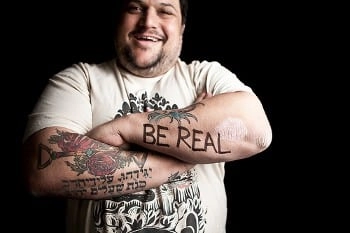 In my life, I held back from openly expressing my thoughts and feelings for years. I worried that people wouldn’t like me, that I’d be abandoned, that gaps in my knowledge would be exposed – all sorts of insecurities.
In my life, I held back from openly expressing my thoughts and feelings for years. I worried that people wouldn’t like me, that I’d be abandoned, that gaps in my knowledge would be exposed – all sorts of insecurities.
My infamous Cee Lo night was just one example of a time that I shared a new part of myself with others (and really, with myself), and everything was okay afterwards. Since that night, I have experienced a new level of confidence that has carried over into other parts of my life.
- Do my eating habits seem weird to you? Don’t care.
- Do you agree with my favorite type of exercise? Don’t care.
- Are you offended that I brought my own salad to your Thanksgiving dinner? Don’t care.
- Does my taste in running music offend you? How dare you?! I still don’t care.
That won’t always be the case, of course. Self-righteous people do exist, and they will judge you. Fake friends are out there, and they will distance themselves.
But in the end, your need to be accepted or validated by others is the surest way to be invisible, unhappy, and unfulfilled in this world. This is YOUR life and your health we’re talking about.
If you allow your self improvement efforts to be hindered by the opinions of others – whose life are you living?
What is it really doing for you?
How long can you keep that up?
My want for you, Warrior, is that you challenge yourself to step outside your comfort zone this week. Do something that scares you – something that’s always scared you.
No matter what the outcome is, the new experience will help you grow as a person, which will directly impact your health journey. Over 140 past TipsOfTheScale guests would agree.
I’d love to hear what that challenge is for you, and the outcome. Share your story in the comments below or email me privately. You can do this!

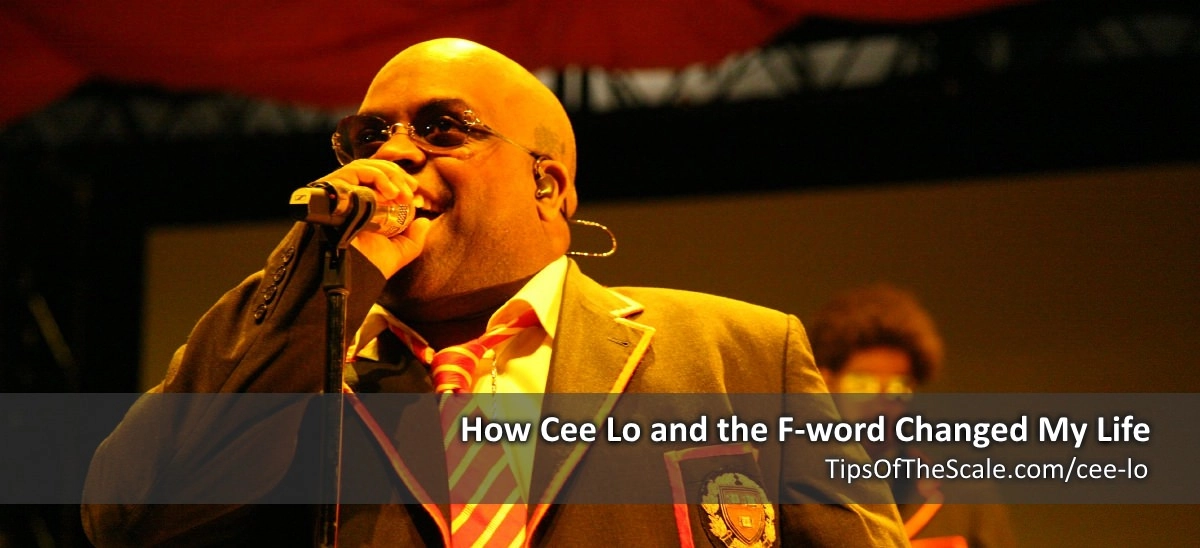
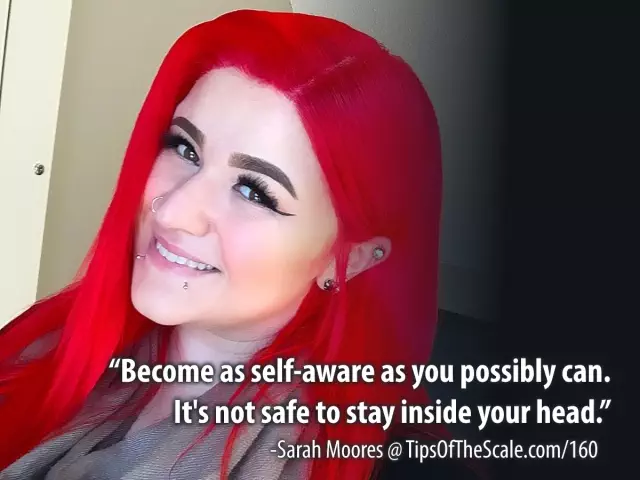
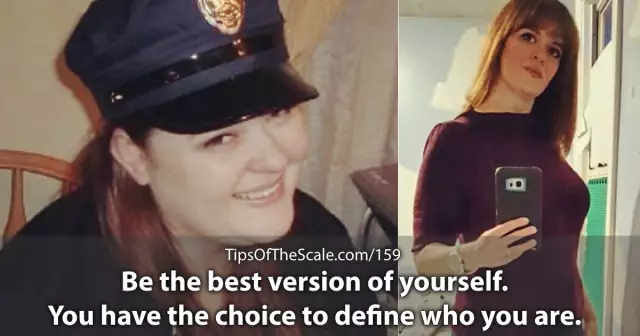

You must be logged in to view comments.